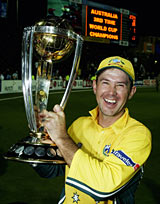Ricky Ponting
Gideon Haigh
The Wisden Forty, including the Leading Cricketer in the World, have been selected by Wisden as the world's top players on the basis of their class and form shown in all cricket during the calendar year 2003. The selections were made in consultation with many of the game's most experienced writers and commentators. In the end, though, they were Wisden's choices, guided by the statistics but not governed by them. The selection panel are no more infallible than any other selectors.
Click here to view the full Wisden Forty list
|
|

|
Ponting's calendar year featured 11 hundreds, five among 1,154 one-day runs at 46.16, and six in 1,503 Test runs at 100.20, including three that became doubles. Yet as impressive as his run-pile's height was the energy with which it was scaled. Ponting hits his attacking shots hard, his defensive strokes barely less hard, and runs every run as though it might be his last. Even at his most restrained and responsible, he impresses one as barely contained, brimful of confidence, ready any moment to bust loose.
For almost its entirety, the same has been thought of Ponting's career; it has been hampered not by doubts of his ability but by certainties. Born in Tasmania's Prospect, he quickly became it. His grandmother dressed fouryear- old Ricky in a T-shirt bearing the legend: "Inside this shirt is an Australian Test cricketer". He had his first equipment deal with Kookaburra at the age of 12, represented his state at 17 and his country at 20; his maiden Test hundred at Headingley in July 1997, when he was 22, suggested not so much a coming man as an arriving and disembarking one.
For the next four years, however, Ponting's career was of the coming-and-going kind. There was more coming than going, as a Test average a tick over 40 from his first 45 Tests suggests, but questions remained about his staying power, except when it was devoted to staying out late: commotions in nightclubs in Calcutta and Sydney tarnished his reputation. Thirty subsequent Tests in which he has averaged 79.73 have answered every interrogatory, plus a few not even asked. His restless cricket intelligence forced him to the forefront of candidates to succeed Steve Waugh as Australian captain; his marriage to Rianna Cantor, an arts/law graduate from University of Wollongong, provided domestic serenity.
Few issues in Australian cricket have caused such public discontent as the cultivation of separate Test and one-day teams. When Waugh's limited-overs mandate was rescinded, one Sydney newspaper ran mug shots of the country's selectors beneath the headline "Wanted: For Incompetence". Some, doubtless, wished their prejudices justified when Ponting was appointed Waugh's one-day successor in February 2002; he did not oblige them. The worst mishap when Australia began their World Cup defence in February 2003 befell them before they took the field, and Ponting so skilfully contained the morale damage from the Shane Warne drug drama that Warne was barely missed. And, with 114 in the first Super Six game against Sri Lanka and 140 not out in the final against India, Ponting was himself Australia's highest scorer of the tournament.
As if to make his own statement about the relationship between the game's two forms, Ponting promptly set about bringing to Test cricket some of his one-day vim. Three Tests against West Indies yielded 523 at 130.75. Series against Bangladesh and Zimbabwe then warmed him up for a rematch with India, who had had Australia's and his measure just under three years earlier: while again more than matching Australia, India had this time to go round Ponting rather than through him. He sold his wicket not just dearly but, with 242 in Adelaide and 257 in Melbourne, downright exorbitantly.
While Ponting's appointment as Waugh's Test successor was welcomed for restoring the five and one-day leaderships to a single custodian, it reasserted some other old Australian cricket values too: that a team's most complete batsman should bat at No. 3 and that the captain is chosen from a nation's best 11 cricketers. Departures from both customs have been countenanced in recent years - not without sound reason - but Ponting seems to fit as snugly into the traditions of his office as any of his antecedents. And, as for "the grind", Ponting seems quite content for it to continue - preferably with Australia doing most of the grinding.

